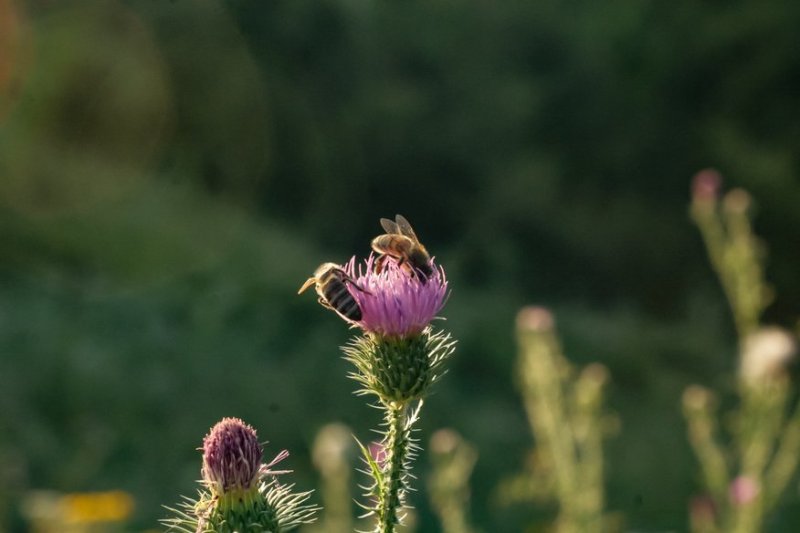No one can deny the benefits that bees give to the world. The world’s food industry depends on them for proper pollination to feed people around the globe. Plants depend on bees to spread their pollen and many homesteaders appreciate the extra help with their crops.
Bees are all around helpful to have if you run a homestead or love to watch them work. They do so much for humans and plants, but what can humans do in return?
Sometimes there are dangers in your backyard without you even realizing it. Instead of accidentally driving your bees away, check out how to keep your backyard safe for bees by following these easy tips.

Provide a Water Pan
Depending on where you live, bees may have great access to water. Nearby lakes, ponds or rivers serve as a natural place for bees to rest and rehydrate before continuing on their pollinating journey, but not everyone has the luxury to live by a natural water source.
If you don’t live where bees can splash around in their free time, provide a water pan with a quick five-minute craft. Find a pan of any size or shape and cover the bottom with craft glue. Spread marbles across the glue and wait for it to dry before filling it with just enough water to almost cover the marbles.
Bees rest on the marbles and drink as they please, while the glue keeps the marbles from sliding around. Remember to refill the water as needed and empty out any debris that lands in there during a windy day. Keep in mind that bees can be very pesky creatures to pool owners, so providing a secondary water source can be helpful.
Avoid Pesticides
Although pesticides are designed to target harmful insects and bugs, they inadvertently hurt curious bees. Strong chemicals cling to the bee’s body, which it carries back to the hive. Every bee back in the hive is then affected by the pesticide, which may kill most of the colony or the hive itself.
Certain pesticides are less harmful, but no chemical-based formula is safe. Pause for a moment to read about pesticide usage to learn about important steps like spraying in the morning before bees become active during the day.
Remove Distracting Weeds
It’s easy to forget to weed your yard when you have so many other responsibilities to handle, but work it into your schedule. Specific weeds can hurt the bee’s pollination and honey production, depending on if they’re the kind that produces pollen, like dandelions. At least a few times per week, remove weeds from flowerbeds as well as around any other crops you may grow.
However, surprisingly enough to some, there are many beekeepers who will in fact fight for the life and growth of weeds as a source for pollinators. Keep your options open!
Plant-Friendly Flowers
Different plants produce varying amounts of pollen, so plant the friendliest flowers that attract bees and give them lots of pollen to take home. The less distance bees travel, the more energy they have to pollinate effectively and make honey. You’ll also attract new bees with better flowers, which grows the hive without much effort on your part.
Bees require large amounts of flowers blooming close together. This is because they work as a group to harvest pollen. This means they will skip over smaller sources for larger groups. Bees also lack the language to describe pollen sources that are close to their hive, which means it may be wise to make your bee garden on the other side of your yard.
Keep Your Mind Open
Whether you’re an experienced beekeeper, a homesteader with plants to pollinate or someone interested in keeping their bees healthy, it’s always a good idea to keep your mind open. There’s never a shortage of things you can learn, which ultimately makes your property more of a safe haven for your friendly neighborhood bees.










4 Comments
What’s wrong dandelions? I would think these & all their health benefits would be good for bees.
Please print by zone bee friendly plants and flowers
Excellent suggestion. While we work on a pretty comprehensive list… here’s a website that has helpful plant and zone information.
https://thehoneybeeconservancy.org/2017/03/27/21-flowers-that-attract-bees/
Great ideas for keeping bees safe! Thought you might enjoy a picture to show how I have prepared for two key challenges to keep them safe in Canada against bears, skunks and the mid-winters freeze! Sadly I cannot paste a picture!
Best wishes,
Iain